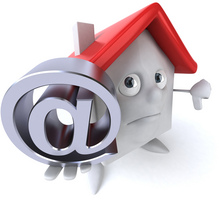 Many believe that a major cause of the recent financial downturn in the economy was an overheated and overextended housing market. In many parts of the country, housing prices increased significantly over the course of just a few years, only to experience a significant decrease in value even more quickly. Many homeowners were caught off-guard by these price changes.
Many believe that a major cause of the recent financial downturn in the economy was an overheated and overextended housing market. In many parts of the country, housing prices increased significantly over the course of just a few years, only to experience a significant decrease in value even more quickly. Many homeowners were caught off-guard by these price changes.
Some homeowners were hit doubly hard by the downturn, because they had taken out large home equity loans or home equity lines of credit when the market values of their homes were at or near their peak. Some of these people lost their homes and destroyed their credit ratings when they were unable to pay back the home equity loans they took out.
Homeowners who were not directly impacted by the recent housing market turmoil (such as if they have owned their homes for many years, or own in a region of the country that did not experience the sharp run-up or drop-off in prices) may now be left wondering whether it’s ever appropriate to take out a home equity loan. Here is some advice on the wisdom of using your home as collateral for a loan.
First, identify how much you are looking to borrow, and what you intend to do with the loan proceeds. Borrowing a significant amount of money against the equity in your house could put your home at risk if you’re unable to repay the loan, so you need to make sure that the purpose for your loan is a good one. A loan for home repair or an improvement that will significantly increase the value of your house may be appropriate, but taking out a home loan so that you can go on a luxurious vacation may not be.
Second, identify how you want to access the equity in your home. There are two basic types of loans: Home Equity Loans, and Home Equity Lines of Credit (“HELOC”). A standard home equity loan is quite similar to a mortgage, while a HELOC is somewhat similar to credit card debt. A HELOC is a revolving credit that can generally be accessed through separate checks or a credit card.
The interest rates applicable to home equity loans and HELOCs can vary greatly. Be sure to shop around with different banks and finance companies to make sure you’re getting the best deal. HELOCs often have variable interest rates, so pay particular attention to the financing terms applicable to those types of credit lines.
Home equity loans and HELOCs are secured against the value of your home, with the home itself as collateral. If you are unable to pay back the money that was borrowed, then the lender may be able to foreclose on your residence. In addition, because you’ve used the house as collateral, you must repay the loan before you can sell your house.
Home equity loans can be a great way to finance significant purchases, provided that you are comfortable with the repayment obligations.
 Many believe that a major cause of the recent financial downturn in the economy was an overheated and overextended housing market. In many parts of the country, housing prices increased significantly over the course of just a few years, only to experience a significant decrease in value even more quickly. Many homeowners were caught off-guard by these price changes.
Many believe that a major cause of the recent financial downturn in the economy was an overheated and overextended housing market. In many parts of the country, housing prices increased significantly over the course of just a few years, only to experience a significant decrease in value even more quickly. Many homeowners were caught off-guard by these price changes. 

